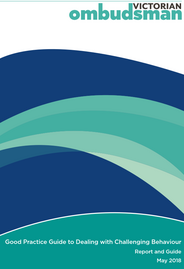Victorian government departments, local councils and other agencies dealing with challenging behaviour from members of the public will benefit from a new guide tabled in the Victorian Parliament today.
Tabling her Good Practice Guide to Dealing with Challenging Behaviour, Victorian Ombudsman Deborah Glass said the guide aimed to help create better understanding between government bodies and the public.
“We are constantly asked for advice from government departments, agencies and local councils on what to do with overly persistent or abusive people,” Ms Glass said. “We also hear from people who complain that an agency won’t deal with them, when they think they have a justified complaint. We recognise this difficult balancing act. The public sector exists to serve the public including those who may be demanding. But public sector resources are limited, and agencies need to protect the health and safety of their workforce.”
Ms Glass said the guide recommends a graduated four-stage response, starting with preventing challenging behaviour where possible by dealing with complaints in a fair, prompt and respectful way, through to the last resort of limiting a member of the public’s access to the organisation.
It sets out the steps public bodies should take to ensure their responses to challenging behaviour are compliant with the Charter of Human Rights and Responsibilities Act, the Equal Opportunity Act, and the Occupational Health and Safety Act. The guide includes tips for dealing with common situations and examples of what does or does not work, based on actual cases.
“I hope the guide helps to de-fuse, de-escalate and de-mystify the behaviours that public servants encounter daily, and that greater understanding leads to fewer complaints,” Ms Glass said.
For more information, read the full report below.
Source: Victorian Ombudsman

